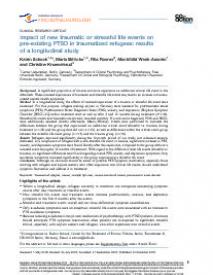Impact of new traumatic or stressful life events on pre-existing PTSD in traumatized refugees : results of a longitudinal study
Background: A significant proportion of trauma survivors experience an additional critical life event in the aftermath. These renewed experiences of traumatic and stressful life events may lead to an increase in trauma-related mental health symptoms.
Method: In a longitudinal study, the effects of renewed experiences of a trauma or stressful life event were examined. For this purpose, refugees seeking asylum in Germany were assessed for posttraumatic stress symptoms (PTS), Posttraumatic Stress Diagnostic Scale (PDS), anxiety, and depression (Hopkins Symptom Checklist [HSCL-25]) before treatment start as well as after 6 and 12 months during treatment (N=46). Stressful life events and traumatic events were recorded monthly. If a new event happened, PDS and HSCL were additionally assessed directly afterwards. Mann–Whitney U-tests were performed to calculate the differences between the group that experienced an additional critical event (stressful vs. trauma) during treatment (n=23) and the group that did not (n=23), as well as differences within the critical event group between the stressful life event group (n=13) and the trauma group (n=10).
Results: Refugees improved significantly during the 12-month period of our study, but remained severely distressed. In a comparison of refugees with a new stressful life event or trauma, significant increases in PTS, anxiety, and depressive symptoms were found directly after the experience, compared to the group without a renewed event during the 12 months of treatment. With regard to the different critical life events (stressful vs. trauma), no significant differences were found regarding overall PTS, anxiety, and depression symptoms. Only avoidance symptoms increased significantly in the group experiencing a stressful life event.
Conclusion: Although all clinicians should be aware of possible PTS symptom reactivation, especially those working with refugees and asylum seekers, who often experience new critical life events, should understand symptom fluctuation and address it in treatment.
In: European journal of psychotraumatology, ISSN 2000-8066 | 7 | november | 32106
http://dx.doi.org/10.3402/ejpt.v7.32106


